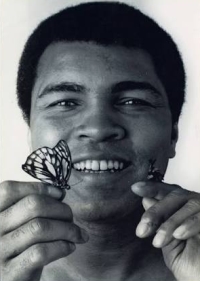
|
Philippines, 28 Feb 2026 |
Home >> News |
 |
||||
|
|
|
|
The Enduring Influence of Muhammad Ali (Third and Last Part) By Teodoro Medina Reynoso PhilBoxing.com Mon, 23 Jan 2023  The fight against Frazier seemed destined for Ali although it eventually came about three years late as their collision course was interrupted by Ali's banishment from boxing between 1967-70. Joe Frazier won the gold in the heavyweight class in the 1964 Tokyo Olympics and turning pro shortly, immediately made an impact by winning all his fights mostly by KO or TKO at the same time Ali was firming his hold of the world heavyweight championship between 1965 and 1966. With the military draft issue hounding him, Ali was forced to slow down with his boxing activity in 1967 just about the time Frazier was picking up on his pace thereby making him a top contender. And his heir apparent which he eventually became when he ascended to the throne left by Ali when Ali was forced out of boxing beginning in late 1967. But during that time too, to many, Ali was still the champion, the uncrowned champion who they regarded as the people's champion and given the fact that both him and Frazier were of high Olympic pedigree, a clash between them was inevitable if Ali was allowed to box again. And so the Battle of the Century happened in March 1971 pitting two former Olympic champions with undefeated record as pros. In that clash, as they say today, one's 0 has to go. Fighters today are obsessed with keeping their immaculate record with many resorting to cherry picking while avoiding as long as possible direct confrontation with their equals. But in Ali's time, following traditions of old, top fighters who are now known as marquee fighters were pitted against all comers, including their likes. And so Ali suffered his first loss, dropping a 15 round unanimous decision to Frazier which was clinched when Smokin' Joe scored that late knockdown. As a top flight fighter and competitor, Ali naturally hated losing but like the greats before him, he recognized that sooner or later one will meet his match or someone even better and that defeat is part of the sport. And Ali did not sulk with that defeat which only strengthened his resolve to continue his comeback and his determination to regain his heavyweight crown. In fact while Frazier did not fight for the rest of 1971 to fully recuperate from his injuries from the Ali fight and save his victory, Ali fought three more times, winning all, two by stoppage. Ali would lose again in 1973, dropping an upset split decision to Ken Norton who broke his jaw early in their fight but Ali exhibited great resilience in finishing that 12 round bout. Ali was a believer in the saying that the greatness of a person is measured not only by the heights of his achievements but by the depths from which he recovers from setbacks and climbs to higher attainments. A quality we have been seen with our very own Manny Pacquiao but absent with his archival Floyd Mayweather Jr and many of the so called top champions and boxers in our time who were and are concerned with keeping their undefeated records. Ali would be rewarded with not just another but a third reign as world heavyweight champion between 1974 (over George Foreman) and 1978 (rematch over Leon Spinks), the first fighter to win the undisputed championship thrice. He would first officially retire as world champion in 1978 though his attempt to win the heavyweight title in 1980 would end in his only stoppage loss to a young Larry Holmes. Ali was instrumental in not only astronomically increasing the fight purse in the heavyweight and boxing in general but also in establishing Las Vegas, Nevada and the United States as a whole as boxing capital of the world. In fact, his Las Vegas success even prompted capitalists and businessmen to establish a counterpart gambling and boxing capital in Atlantic City, New Jersey, which became the venue of many a memorable world boxing fights and cultural events since his time. It was from this that Bob Arum who happened to be one of Ali's main handlers and promoters, borrowed the idea of promoting fights even in the gambling and tourism haven as Macau in China that benefited primarily Pacquiao in his championship heydays. Click here for Part Two of this series. Click here for Part One of this series. The author Teodoro Medina Reynoso is a veteran boxing radio talk show host living in the Philippines. He can be reached at teddyreynoso@yahoo.com and by phone 09215309477. Click here to view a list of other articles written by Teodoro Medina Reynoso. |
|
|
PhilBoxing.com has been created to support every aspiring Filipino boxer and the Philippine boxing scene in general. Please send comments to feedback@philboxing.com |
PRIVATE POLICY | LEGAL DISCLAIMER
developed and maintained by dong secuya © 2026 philboxing.com. |